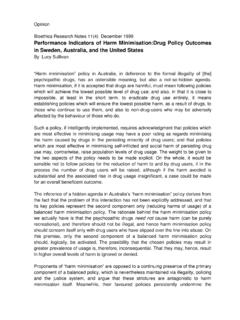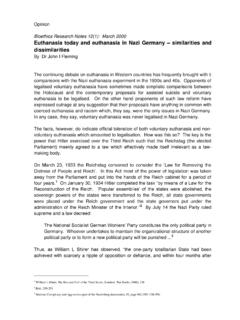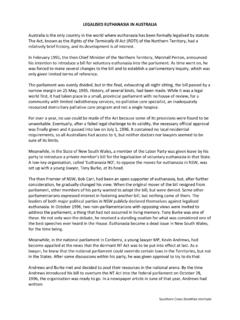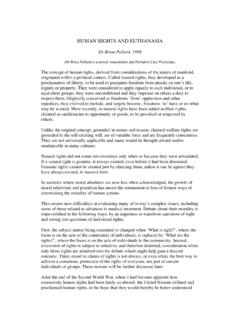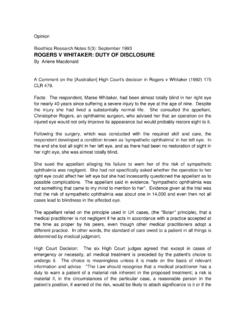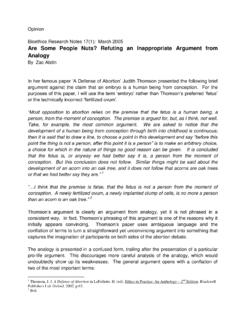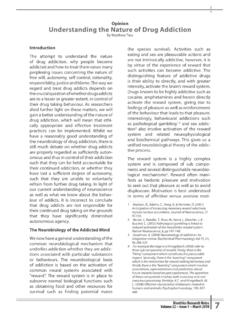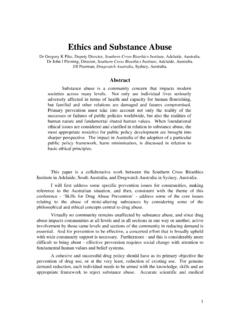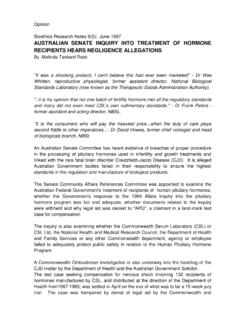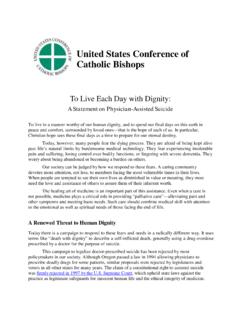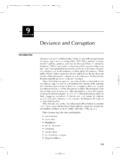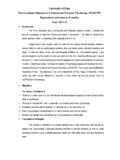Transcription of Substance abuse, ethics and public policy
1 1 Opinion Bioethics Research Notes 13(3): September 2001 Substance abuse , ethics and public policy By Dr Gregory K Pike The problem of Substance abuse is testing public norms once again. Why once again? Because this is not the first time that the personal and social damage caused by the abuse of mind-altering drugs has reached the point where public policy makers are anxiously searching for new approaches. History is littered with drug dilemmas. Most notably perhaps was the abuse of opium in China, and interestingly, during the Opium Wars of the last century the Emperor of China repeatedly pleaded with the British to halt the smuggling of opium into his country by British merchants.
2 However, British representatives in China urged the Emperor to legalise the trade, highlighting the vast revenue to be raised for both sides by the subsequent increase in use. But the Emperor remained resolute. He said: It is true, I cannot prevent the introduction of the flowing poison; gain-seeking and corrupt men will for profit and sensuality defeat my wishes, but nothing will induce me to derive a revenue from the vice and misery of my The Emperor recognised the damage to his society by the pervasive use of opium and refused to become complicit in what he saw as a social evil.
3 He refused to allow opium use to become normalised into everyday Chinese life. It was too harmful and was tantamount to consigning to the grip of addiction even greater numbers of his people than were already affected. In the latter half of the nineteenth century, drug abuse and addiction were at times deeply problematic in the USA and the UK, and England between 1820 and 1930 has been described as completely narcotised 2. Such widespread use led to increased problem use, and dealing with those addicted taxed some of the best medical minds.
4 Around the turn of the century, despite heated dispute, a consensus began to emerge about a theory of addiction, and writers were generally in agreement on the major issues, one of which was that: .. substitution of drugs such as cocaine, cannabis indica, or even heroin - which had been variously recommended in the last three decades of the nineteenth century - was a terrible 1 England and the Opium Trade , Society for the Suppression of the Opium Trade pamphlet, Dyer Brothers, London, 1880, 6.
5 2 Terry M. Parssinen, Secret Passions, Secret Remedies. Narcotic Drugs in British Society 1820-1930. Manchester University Press, Philadelphia, 1983, ix. 3 Terry M, Parssinen, Secret Passions, Secret Remedies. Narcotic Drugs in British Society 1820-1930. Manchester University Press, Philadelphia, 1983: 96,97. 2 This terrible mistake , that is government sanctioned provision of addictive mind-altering substances, had seemed an attractive proposition to some, given the tenacity of addiction and the failure of many treatment efforts.
6 For some it was much easier just to let the state freely provide the sought-after substances and be done with it. And so today the wheel has turned again and similar proposals are being considered for a problem that not only refuses to go away, but escalates. So what should the public policy be, and what values should the relevant laws reflect? At a time when the underlying value systems and principles that inform the framing of the pertinent laws are being reconsidered by some elites, it is worth being reminded of the meaning of laws.
7 As moral philosopher Germain Grisez notes: .. law s effectiveness depends far more on forming the majority s practical reasoning and judgements than on forcing the unwilling minority to Laws have educative value far beyond their ability to rein in law-breakers. They reflect deeply held values commonly shared across the community and serve to instruct all and sundry regardless of whether ultimately they are transgressed. Hence, the Prime Minister is right to be concerned that heroin trials for example, will send the wrong message , for the principal part of the message that the requisite legal change would signify, particularly when interpreted by youth, would be that the state considers maintaining addiction to be a valid way of treating addiction.
8 And young people are smart enough to read between the lines and see that this really means that the powers that be would consider addiction per se not to be a problem. A corollary might be that addicts are not worth the hard work of really helping them with what they truly want, that is, to no longer be enslaved to heroin. The reality of addiction is captured in the words of Jason van den Boogert: .. there is no doubt that heroin has got a fierce hold of me and (the by-now tattered remains of) my life, and shows little sign of letting go permanently, , I don t know what will get this creeping rot out of my life for good.
9 I have been clean many times but I feel that addiction has almost altered the chemical balance of my brain and from here on out life, clean or not, is going to be lived in relation to that thrown In the extreme tunnel vision that is addiction, life is bondage. And treatments that serve to perpetuate that addiction are state-sponsored assistance to self-destruction. 4 Germain Grisez, Should the city council vote to supply needles to drug addicts?
10 In: The Way Of The Lord Jesus. Vol. 3. Difficult Moral Questions, Franciscan Press, Quincy University, Illinois, 1997, 830. 5 Jason van den Boogert, Mutiny in Heaven. In: Heroin Crisis. Bookman Press, Melbourne, 1999, 15. 3 The root of the word addiction can be found in the Latin addicere, which means to enslave. To be addicted is to be enslaved to something inherently harmful, not only because of its detrimental effects upon the body, but primarily because the influence upon the mind serves to damage that which is truly defining about being human that is the uniquely human capacity to think and reason.
